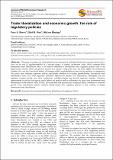| dc.date.accessioned | 2020-12-11T06:09:04Z | |
| dc.date.available | 2020-12-11T06:09:04Z | |
| dc.date.issued | 2013 | |
| dc.identifier.uri | http://repository.kippra.or.ke/handle/123456789/2374 | |
| dc.description.abstract | This paper investigates the relationship between international trade liberalization and economic growth with a focus on the role of regulatory policies in a selected sample of sixteen sub-Saharan Africa (SSA) countries. While international trade liberalization refers to the removal of barriers to international trade, regulatory policies refer to the improvement of credit, labour and product markets in a country. Using panel data, the study applies the Instrumental Variables (IV) and the Generalized Method of Moments (GMM)methodologies to deal with the problem of endogeneity. The results show that better regulatory policies significantly contribute to economic growth. Further, international trade liberalization works well when regulatory policies are improved in tandem with liberalization. This implies that less regulated countries benefit more from international trade liberalization than heavily regulated countries. Therefore, improvements in policies that regulate credit, labour and product markets will enhance the gains from international trade liberalization in Sub-Saharan Africa. Further, the results show that accumulation of physical capital contributes to economic growth. Thus, Sub-Saharan African countries should reform their regulatory policies as they continue to deepen international trade liberalization. | en |
| dc.language.iso | en | en |
| dc.publisher | Journal of World Economic Research | en |
| dc.relation.ispartofseries | Journal Article;2013 | |
| dc.subject | Economic Growth, | en |
| dc.subject | Trade Liberalization, | en |
| dc.subject | Regulatory Policies | en |
| dc.title | Trade Liberalization and Economic Growth: The Role of Regulatory Policies | en |
| dc.type | Journal Article | en |
| ppr.contributor.author | Biwott, Peter K. ; Moyi, Eliud & Khainga, Dickson | |

